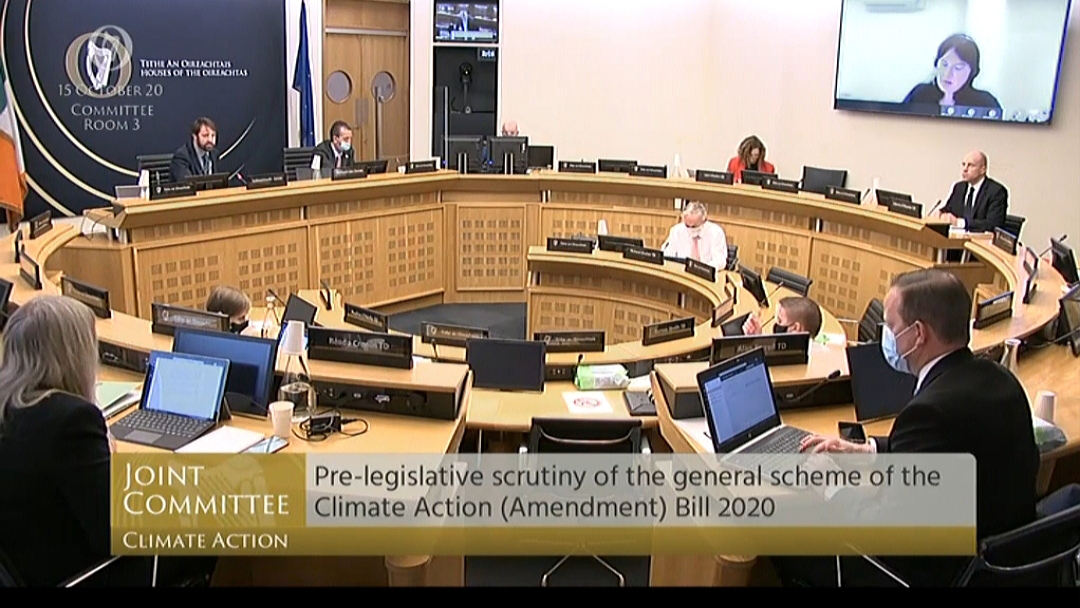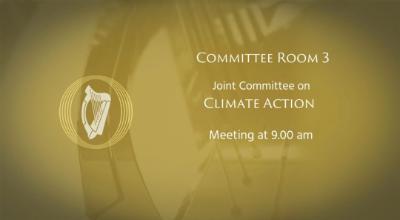Dr Áine Ryall gives evidence to Oireachtas Joint Committee on Climate Action

Dr Áine Ryall, Co-Director of the Centre for Law & the Environment at UCC, appeared before the Committee on Climate Action on 15 October 2020.
The Committee is examining the recently published Climate Action and Low Carbon Development (Amendment) Bill 2020. The Bill proposes to introduce significant amendments designed to strengthen Ireland’s existing framework climate legislation.

Dr Ryall is an internationally recognised expert on environmental law, climate law and human rights. She serves as Vice-Chair of the UN ECE Aarhus Convention Compliance Committee. This quasi-judicial body oversees the implementation of environmental human rights across the 47 States that have ratified the Convention. Dr Ryall appeared before the Climate Action Committee in her personal capacity.
Dr Ryall served previously as a member of the Expert Advisory Group to the Citizens’ Assembly during the climate change module of the Assembly’s work (2016-2018).
In her Opening Statement to the Climate Action Committee Dr Ryall welcomed the publication of the Bill:
“This Bill is urgent. We must make progress in a timely fashion. But it is also essential that the legislation that emerges at the end of this process is fit for purpose and that it enables Ireland to meet its climate obligations.”
Referring to the recent Supreme Court judgment in Climate Case Ireland (31 July 2020), Dr Ryall identified two particular points relevant to the discussion of the Bill:
“First, the Supreme Court judgment is very strong on the principles of public participation and transparency in the formation and publication of climate policy. This is a very welcome development. It underpins the core values that should inform all environmental decision-making – participation, transparency and accountability. This element of the judgment also provides a strong impetus to ensure that the Bill provides effective opportunities for public participation and that, for example, reasonable timeframes are put in place in the legislation to facilitate informed and effective participation in the development of climate policy.”
She continued:
“It is disappointing, in my view, that an effort was not made when the Bill was first published to provide an ‘unofficial’ consolidated text incorporating the amendments proposed to be made by the Bill to the current text of the 2015 Act. This could have been done by way of tracked changes, for example, in a Word document. An ‘unofficial’ consolidated text of this nature would be an invaluable reference point and an important resource to enable the public, and those who are not familiar with navigating Bills and complex amendments to legislation, to engage more effectively with the pre-legislative scrutiny process.”
A second point arising from the Supreme Court judgment is the “significant weight” that the Court placed on the views expressed by the Climate Change Advisory Council.
Dr Ryall observed that:
“It seems clear from the judgment that the Council’s persistent and stinging critiques of Government policy played an important role in the Supreme Court’s analysis. This confirms the vital role played by the Council and the importance of strengthening its independence and its oversight role and ensuring that it has the necessary range of expertise and resources to support its expanded mandate under the Bill.”
Dr Ryall also stressed the importance of including effective oversight and enforcement mechanisms in the Bill to ensure that the State can be held accountable for any breach of its climate obligations.
She concluded:
“This Bill provides a timely opportunity to take steps to turn the corner on Ireland’s traditional “laggard” reputation on climate change. We face an existential crisis. The time to act effectively is rapidly running out. We must deliver robust, workable climate legislation that supports a just transition and protects human rights. And we must ensure that the new legislation has the necessary impact across the economy and society to deliver the transformative changes required within the specified timeframes.”
"We cannot afford to squander this opportunity to strengthen Ireland’s climate legislation and to renew our commitment to ambitious climate action.”
Watch the evidence session now

Link to the video of the session of the Climate Action Committee on 15 October 2020 - Pre-legislative Scrutiny of the Climate Action and Low Carbon Development (Amendment) Bill 2020.
Further reading
Dr Ryall’s appearance at the Climate Action Committee was reported in the Irish Times, Irish Independent and Green News.ie
